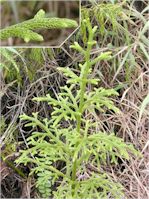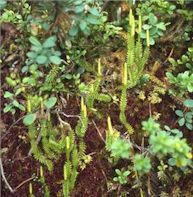 |
Though not generally thought worth more than a passing notice, or to possess any claims of a medicinal sort, yet the Club Moss, which is of common growth in Great Britain on heaths and hilly pastures, exerts by its spores very remarkable curative effects, and therefore it should be favorably regarded as a Herbal Simple. It is exclusively due to homoeopathic provings and practice, that the Lycopodium clavatum (Club Moss) takes an important position amongst the most
curative vegetable remedies of the present day.
The word lycopodium means "wolf's claw," because of the claw-like ends to the trailing stems of this moss; and the word clavatum signifies that its inflorescence |
resembles a club. The spores of Club Moss constitute a fine pale-yellow, dusty powder which is unctuous, tasteless, inodorous, and only medicinal when pounded in all agate mortar until the individual spores, or nuts, are fractured.
By being thus triturated, the nuts give out their contents, which are shown to be oil globules, wherein the curative virtues of the moss reside. Sugar of milk is then rubbed up for two hours or more with the broken spores, so as to compose a medicinal powder, which is afterwards to be further diluted; or a tincture is made from the fractured spores, with spirit of ether, which will develop their specific medicinal properties. The Club Moss, thus prepared, has been
experimentally taken by provers in varying material doses; and is found through its toxical affinities in this way to be remarkably useful for chronic mucous indigestion and mal-nutrition, attended with sallow complexion, slow, difficult digestion, flatulence, waterbrash, heartburn, decay of bodily strength, and mental depression. It is said that whenever a fan-like movement of the wings of the nostrils can be observed during the breathing, the whole group of symptoms thus
detailed is specially curable by Club Moss.
As a dose of the triturated powder, reduced to a weaker dilution, ten grains may be taken twice a day mixed with a dessertspoonful of water; or of the tincture largely reduced in strength, ten drops twice a day in like manner. Chemically, the oil globules extracted from the spores contain "alumina" and "phosphoric acid." The diluted powder has proved practically beneficial for reducing the swelling and for diminishing the pulsation of aneurism when affecting a main
blood-vessel of the heart.
In Cornwall the Club Moss is considered good against most diseases of the eyes, provided it be gathered on the third day of the moon when first seen; being shown the knife whilst the gatherer repeats these words:
"As Christ healed the issue of blood,
Do thou cut what thou cut test for good."
"Then at sundown the Club Moss should be cut by the operator whilst kneeling, and with carefully washed hands. It is to be tenderly wrapped in a fair white cloth, and afterwards boiled in water procured from the spring nearest the spot where it grew," and the liquor is to be applied as a fomentation; or the Club Moss may be "made into an ointment with butter from the milk of a new cow." Such superstitious customs had without doubt a Druidic origin, and they identify the Club
Moss with the Selago, or golden herb, "Cloth of Gold" of the Druids. This was reputed to confer the power of understanding the language of birds and beasts, and was intimately connected with some of their mysterious rites; though by others it is thought to have been a sort of Hedge Hyssop (Gratiola).
 |
The Common Lycopodium bears in some, districts the name of "Robin Hood's hatband." Its unmoistenable powder from the spores is a capital absorbing application to weeping, raw surfaces. At the shops, this powder of the Club Moss spores is sold as "witch meal," or "vegetable sulphur." For trade purposes it is obtained from the ears of a Wolfsfoot Moss, the Lycopodium clavatum, which grows in the forests of Russia and Finland.
The powder is yellow of color, dust-like and smooth to the touch. Half a drachm of it given during July in any proper vehicle has been esteemed "a noble remedy to cure stone in the bladder." Being mixed with black pepper, it was recognized by the College of Physicians in 1721 as a medicine of singular |
value for preventing and curing hydrophobia. Dr. Mead, who had repeated experience of its worth, declared that he never knew it to fail when combined with cold bathing.
Club Moss powder ignites with a flicker, and is used for stage lightning. It is the Blitzmehl, or lightning-meal of the Germans, who give it in doses of from fifteen to twenty grains for the cure of epilepsy in children.
When the "Mortal Struggle" was produced (see Nicholas Nickleby) by Mr. Vincent Crummles at Portsmouth, with the aid of Miss Snevelicci, and the Infant Phenomenon, lurid lightning was much in request to astonish the natives; and this was sufficiently well simulated by igniting, with a sudden flash and a hiss, highly inflammable spores of the Club Moss projected against burning tow within a hollow cone, producing weird scenic effects.
Herb Simples
The Primitive Simplers presented here show the way of life in other generations, it is not suggested or recommended trying them yourself. |
|
Garden
Herbs
Home
History of Herbs
Herb Gardening
Herbs for Beginners
Drying & Preserving Herbs
Indoor Herb Gardening
Herb Garden
Hints & Tips
Herbal
Cooking
Herb Chart
Using Herbs
Culinary Herbs
Herb
Oil and Vinegar
Herb Teas
Herb Candy
Herb Jelly
Herb Simples
Preface
Introduction
Alphabetical Listing

Trade
Recipes Online
Share your Recipes with others!!
|



